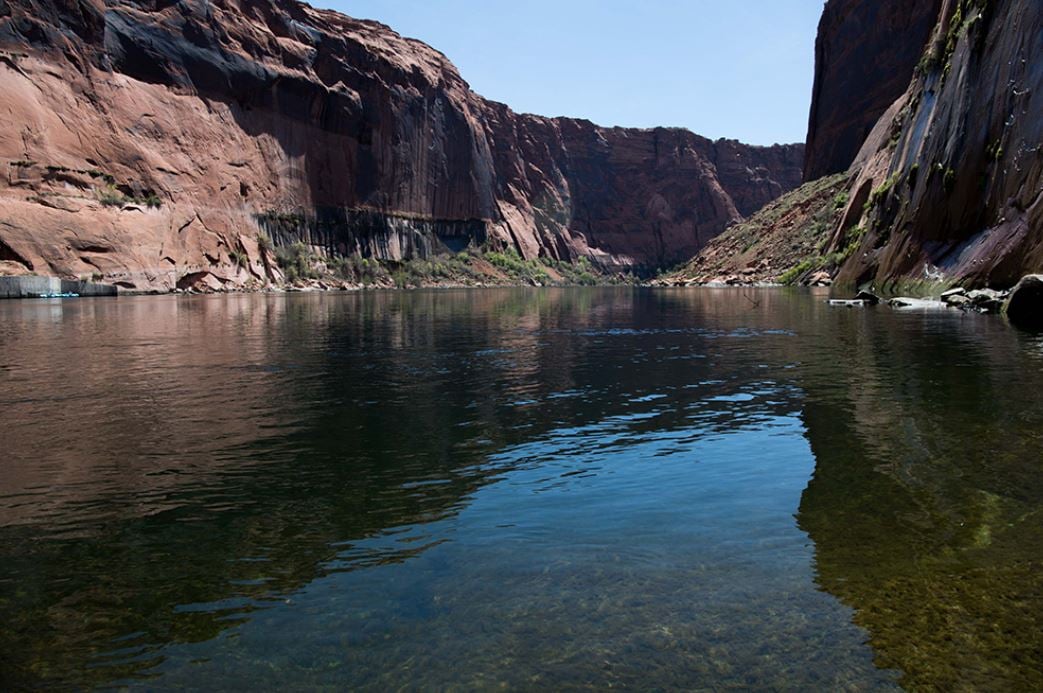Congress Passes Colorado River Drought Contingency Plan

Bipartisan legislation enacting a long sought after drought plan for seven states in the Colorado River basin has been sent to the White House for President Donald Trump’s signature.
Senator Martha McSally, R-Ariz., and Representative Raul Grijalva, D-Ariz., fast-tracked passage of the legislation, getting approved by both the House and Senate in a matter of days after two years of negotiations by state level stakeholders including farmers, cities and Native American tribes.
Congressional and presidential approval is required for interstate compacts, and the bill’s sponsors and supporters stressed the deal’s importance to avoid dire consequences.
The Colorado River provides water to about 40 million people and 5.5 million acres of irrigated agriculture in Arizona, California, Colorado, Nevada, New Mexico, Utah and Wyoming.
Since 2000, the river basin has experienced historically dry conditions and combined storage in Lakes Powell and Mead has reached its lowest level since Lake Powell initially began filling in the 1960s, according to a joint letter signed by the governors of the affected states.
Last year’s runoff into the Colorado River was the second lowest since 2000, and there is no sign that the trend of extended dry conditions will end any time soon even if 2019 provides above average runoff, the governors said.
Lakes Powell and Mead could reach critically low levels as early as 2021 if conditions do not significantly improve, they added.
“This is about the livelihood of and the safety of 40 million Americans,” Senator McSally said prior to the vote on the bill in the Senate. “The Colorado River DCP Authorization Act puts sound water policy over partisanship.”
McSally went on to speak of the bipartisan cooperation among the Senators from the seven states and the overwhelming and immediate support the legislation received.
“The passage of the DCP authorization today showcases how Congress should work — a large, bipartisan effort where we all sprang into action to deliver real results for Arizonans and the American people,” she said. “Arizonans want to see action and results, not political games.”
Arizona’s Democratic senior senator, Kyrsten Sinema, agreed.
“I’m proud to have worked closely with Arizona stakeholders and colleagues on both sides of the aisle to keep the DCP legislation moving forward and help secure Arizona’s water future,” Sinema said. “I thank my colleagues in the U.S. House and Senate and will keep working to ensure the plan is signed into law.”
The legislation, S. 1057, establishes voluntary water conservation measures that will help manage prolonged drought conditions and regional climate change impacts throughout the Southwest. It also places an emphasis on maintaining water levels in Lake Mead and Lake Powell, the river’s two largest reservoirs, so that no one stakeholder group runs completely dry and water driven turbines at both sites continue to generate reliable power.”
“Severe droughts will become more frequent in the West as our climate continues to change, so we have to be prepared by saving more water from the wet years for the dry ones,” Sen. Dianne Feinstein, D-Calif., said in a statement.
The alternative to the plan would likely include dramatic water delivery cuts should reservoir levels fall below certain thresholds.
“This bill is a bipartisan, multi-state solution to a multi-state problem, and nothing should stand in the way of it becoming law as soon as possible,” Representative Grijalva said shortly before his companion bill was approved in the House. “I encourage the president to quickly sign it.”
As of Wednesday morning, Lake Mead sat just 14.68 feet above the mark of 1,075 feet above sea level that would trigger mandatory water restrictions under an interim agreement dating back to 2007.
The goal with this year’s agreement is to hold off those cuts with progressively severe cutbacks as the water level at the lake drops.
“Unfortunately the last 19 years have been the Colorado Basin’s driest on record, leaving water supplies for major cities at risk of reaching crisis levels,” McSally said.
Lake Powell, straddling the border of Utah and Arizona, is down 42.77 feet from one year ago.
“The drought created by climate change in the Southwest has made our area more arid, made water more precious and more finite, and we have to deal with that question,” Grijalva said.
Commissioner Brenda Burman of the U.S. Bureau of Reclamation, which had threatened to impose mandatory water restrictions if a deal hadn’t been worked out, said she was “pleased that collaborative efforts among the seven Colorado River Basin states, local water agencies, Tribes, non-governmental organizations, Mexico and the Department of the Interior to reduce risk on the Colorado River are succeeding.”
“I applaud Congress for taking prompt action on implementing legislation for the Drought Contingency Plans,” Burman continued. “This brings us one step closer to supporting agriculture and protecting the water supplies for 40 million people in the United States and Mexico. Working together remains the best approach for all those who rely on the Colorado River.”
The swift, bipartisan action in Congress was also applauded by several environmental groups, including the Environmental Defense Fund.
“This is a major step toward a more secure future for the Southwestern United States and a valuable model for building climate resilience for the entire country,” said EDF President Fred Krupp.
“Water scarcity is a reality in the American West, and leaders in the region recognize that new thinking and collaboration on an unprecedented scale are required to take on this challenge. People and wildlife alike will be better off thanks to their work,” he said.


























